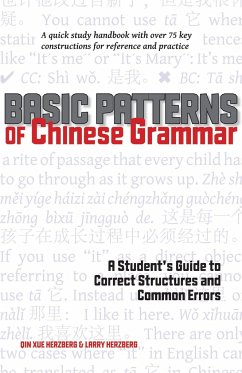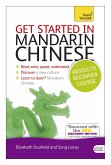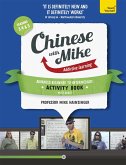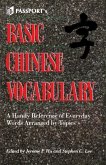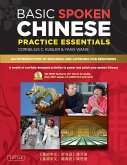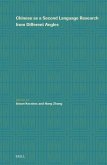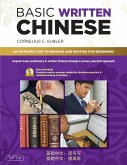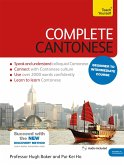Qin Xue Herzberg, Larry Herzberg
Basic Patterns of Chinese Grammar
A Student's Guide to Correct Structures and Common Errors
12,99 €
inkl. MwSt.
Versandfertig in über 4 Wochen

6 °P sammeln
Qin Xue Herzberg, Larry Herzberg
Basic Patterns of Chinese Grammar
A Student's Guide to Correct Structures and Common Errors
- Broschiertes Buch
- Merkliste
- Auf die Merkliste
- Bewerten Bewerten
- Teilen
- Produkt teilen
- Produkterinnerung
- Produkterinnerung
A handy classroom, test-prep, and study supplement to help you speak and write with confidence while avoiding common mistakes.
Andere Kunden interessierten sich auch für
![Get Started in Mandarin Chinese Absolute Beginner Course Get Started in Mandarin Chinese Absolute Beginner Course]() Elizabeth ScurfieldGet Started in Mandarin Chinese Absolute Beginner Course28,99 €
Elizabeth ScurfieldGet Started in Mandarin Chinese Absolute Beginner Course28,99 €![Learn Chinese with Mike Advanced Beginner to Intermediate Activity Book Seasons 3, 4 & 5 Learn Chinese with Mike Advanced Beginner to Intermediate Activity Book Seasons 3, 4 & 5]() Mike HainzingerLearn Chinese with Mike Advanced Beginner to Intermediate Activity Book Seasons 3, 4 & 518,99 €
Mike HainzingerLearn Chinese with Mike Advanced Beginner to Intermediate Activity Book Seasons 3, 4 & 518,99 €![Basic Chinese Vocabulary Basic Chinese Vocabulary]() Jerome HuBasic Chinese Vocabulary19,99 €
Jerome HuBasic Chinese Vocabulary19,99 €![Basic Spoken Chinese Practice Essentials Basic Spoken Chinese Practice Essentials]() Cornelius C KublerBasic Spoken Chinese Practice Essentials10,99 €
Cornelius C KublerBasic Spoken Chinese Practice Essentials10,99 €![Chinese as a Second Language Research from Different Angles Chinese as a Second Language Research from Different Angles]() Chinese as a Second Language Research from Different Angles130,99 €
Chinese as a Second Language Research from Different Angles130,99 €![Basic Written Chinese Basic Written Chinese]() Cornelius C KublerBasic Written Chinese19,99 €
Cornelius C KublerBasic Written Chinese19,99 €![Complete Cantonese Beginner to Intermediate Course Complete Cantonese Beginner to Intermediate Course]() Hugh BakerComplete Cantonese Beginner to Intermediate Course43,99 €
Hugh BakerComplete Cantonese Beginner to Intermediate Course43,99 €-
-
-
A handy classroom, test-prep, and study supplement to help you speak and write with confidence while avoiding common mistakes.
Hinweis: Dieser Artikel kann nur an eine deutsche Lieferadresse ausgeliefert werden.
Hinweis: Dieser Artikel kann nur an eine deutsche Lieferadresse ausgeliefert werden.
Produktdetails
- Produktdetails
- Verlag: Stone Bridge Press
- Seitenzahl: 128
- Erscheinungstermin: 21. Dezember 2010
- Englisch
- Abmessung: 221mm x 141mm x 10mm
- Gewicht: 215g
- ISBN-13: 9781933330891
- ISBN-10: 1933330899
- Artikelnr.: 29951862
- Herstellerkennzeichnung
- Libri GmbH
- Europaallee 1
- 36244 Bad Hersfeld
- gpsr@libri.de
- Verlag: Stone Bridge Press
- Seitenzahl: 128
- Erscheinungstermin: 21. Dezember 2010
- Englisch
- Abmessung: 221mm x 141mm x 10mm
- Gewicht: 215g
- ISBN-13: 9781933330891
- ISBN-10: 1933330899
- Artikelnr.: 29951862
- Herstellerkennzeichnung
- Libri GmbH
- Europaallee 1
- 36244 Bad Hersfeld
- gpsr@libri.de
Larry Herzberg and Qin Herzberg, a married couple, are professors of Chinese language and culture at Calvin College in Michigan. They travel to China every year, both with students and without, and have been featured travel experts on MSNBC and other outlets. Qin and Larry live in Grand Rapids, Michigan, and are also co-authors of Basic Patterns of Chinese Grammar: A Student’s Guide to Correct Structures and Common Errors (Stone Bridge Press, 2011) and Chinese Proverbs and Popular Sayings: With Observations on Culture and Language (Stone Bridge Press, 2012). Larry Herzberg did his PhD work in Chinese and founded the Chinese language programs at Albion College and Calvin College; he is also a professional violinist. In 2011 Larry was awarded the Presidential Award for Exemplary Teaching, the highest honor that Calvin College bestows on a faculty member. Qin Xue Herzberg, a graduate of Beijing Normal University, has taught Chinese for decades and has been an upper-level Chinese professor at Calvin College for more than ten years.
INTRODUCTION CHAPTER ONE: BASIC WORD ORDER 1) Basic Word Order 2) Action and Location 3) Action and Time 4) Word Order for When Something Happens 5) Duration of Time 6) Placement of the word "Why?" CHAPTER TWO: TIME EXPRESSIONS 1) When/While... 2) Days, Weeks, Months, Years CHAPTER THREE: NOUNS 1) Plurals 2) Counting Things 3) "This" and "That" 4) Nouns for Nationalities and Languages 5) "All" of some Noun 6) Indefinites 7) Not Even One Bit of Something 8) Location Words CHAPTER FOUR: VERBS 1) Past Tense 2) Present Tense 3) Future Tense 4) The Word "It" with Verbs 5) Helping Verbs 6) Going, Coming, Returning 7) The "Ba" Pattern with Verbs 8) The "Shi...de" Pattern with Past Tense Action Verbs 9) Passive Voice CHAPTER FIVE: ADJECTIVES 1) General Rules for Adjectives 2) How to Translate "Bad" 3) "Not Bad" 4) "Nice" 5) "Pretty" 6) Positive Comparisons 7) Negative Comparisons CHAPTER SIX: USES OF THE PARTICLE "LE" 1) Action Verbs in Past Tense 2) Change of Status with Adjectives 3) Imminent Action 4) "Not Any More" CHAPTER SEVEN: USES OF THE PARTICLE "DE" 1) Uses of
(de) 2) Uses of
(de) 3) Uses of
(de) CHAPTER EIGHT: CONJUNCTIONS (AND; OR) 1) "And": Connecting nouns; verbs and adjectives 2) "Or": In a statement; in a question CHAPTER NINE: SUBORDINATE CLAUSES 1) Connecting sentences with "who"/"that" 2) If...then 3) As soon as 4) Even 5) Because 6) No Matter Whether 7) Besides? CHAPTER TEN: How to Express the verb "can" in Chinese 1) Know how to (hui) 2) Physically able (neng) 3) May/permitted (keyi) 4) Resultative Endings? CHAPTER ELEVEN: Word Choice Issues with Certain Important Verbs 1) To "be" ("shi" vs. "zuo" vs. "dang") 2) To "know" ("zhidao" vs. "renshi") 3) "Like" vs. "Would like to" ("xihuan" vs. "xiang") 4) "To think/to feel" ("xiang" vs. "juede") 5) "To ask" 6) "To tell" 7) "To seem like" ("haoxiang" vs. "xiang") 8) "To receive" 9) "To be afraid" 10) "To worry" 11) "To help" 12) "To take" 13) "To lose" 14) "To produce"? CHAPTER TWELVE: Word Choice Issues with Adverbs 1) "from" 2) "first" 3) "actually" 4) "although" 5) "almost" 6) "unless" 7) "every time" CHAPTER THIRTEEN: Letter Writing Issues 1) Greetings and Salutations 2) Writing to one's Parents 3) Closing the Letter 4) More on Ending the Letter 5) Social Niceties
(de) 2) Uses of
(de) 3) Uses of
(de) CHAPTER EIGHT: CONJUNCTIONS (AND; OR) 1) "And": Connecting nouns; verbs and adjectives 2) "Or": In a statement; in a question CHAPTER NINE: SUBORDINATE CLAUSES 1) Connecting sentences with "who"/"that" 2) If...then 3) As soon as 4) Even 5) Because 6) No Matter Whether 7) Besides? CHAPTER TEN: How to Express the verb "can" in Chinese 1) Know how to (hui) 2) Physically able (neng) 3) May/permitted (keyi) 4) Resultative Endings? CHAPTER ELEVEN: Word Choice Issues with Certain Important Verbs 1) To "be" ("shi" vs. "zuo" vs. "dang") 2) To "know" ("zhidao" vs. "renshi") 3) "Like" vs. "Would like to" ("xihuan" vs. "xiang") 4) "To think/to feel" ("xiang" vs. "juede") 5) "To ask" 6) "To tell" 7) "To seem like" ("haoxiang" vs. "xiang") 8) "To receive" 9) "To be afraid" 10) "To worry" 11) "To help" 12) "To take" 13) "To lose" 14) "To produce"? CHAPTER TWELVE: Word Choice Issues with Adverbs 1) "from" 2) "first" 3) "actually" 4) "although" 5) "almost" 6) "unless" 7) "every time" CHAPTER THIRTEEN: Letter Writing Issues 1) Greetings and Salutations 2) Writing to one's Parents 3) Closing the Letter 4) More on Ending the Letter 5) Social Niceties
INTRODUCTION CHAPTER ONE: BASIC WORD ORDER 1) Basic Word Order 2) Action and Location 3) Action and Time 4) Word Order for When Something Happens 5) Duration of Time 6) Placement of the word "Why?" CHAPTER TWO: TIME EXPRESSIONS 1) When/While... 2) Days, Weeks, Months, Years CHAPTER THREE: NOUNS 1) Plurals 2) Counting Things 3) "This" and "That" 4) Nouns for Nationalities and Languages 5) "All" of some Noun 6) Indefinites 7) Not Even One Bit of Something 8) Location Words CHAPTER FOUR: VERBS 1) Past Tense 2) Present Tense 3) Future Tense 4) The Word "It" with Verbs 5) Helping Verbs 6) Going, Coming, Returning 7) The "Ba" Pattern with Verbs 8) The "Shi...de" Pattern with Past Tense Action Verbs 9) Passive Voice CHAPTER FIVE: ADJECTIVES 1) General Rules for Adjectives 2) How to Translate "Bad" 3) "Not Bad" 4) "Nice" 5) "Pretty" 6) Positive Comparisons 7) Negative Comparisons CHAPTER SIX: USES OF THE PARTICLE "LE" 1) Action Verbs in Past Tense 2) Change of Status with Adjectives 3) Imminent Action 4) "Not Any More" CHAPTER SEVEN: USES OF THE PARTICLE "DE" 1) Uses of
(de) 2) Uses of
(de) 3) Uses of
(de) CHAPTER EIGHT: CONJUNCTIONS (AND; OR) 1) "And": Connecting nouns; verbs and adjectives 2) "Or": In a statement; in a question CHAPTER NINE: SUBORDINATE CLAUSES 1) Connecting sentences with "who"/"that" 2) If...then 3) As soon as 4) Even 5) Because 6) No Matter Whether 7) Besides? CHAPTER TEN: How to Express the verb "can" in Chinese 1) Know how to (hui) 2) Physically able (neng) 3) May/permitted (keyi) 4) Resultative Endings? CHAPTER ELEVEN: Word Choice Issues with Certain Important Verbs 1) To "be" ("shi" vs. "zuo" vs. "dang") 2) To "know" ("zhidao" vs. "renshi") 3) "Like" vs. "Would like to" ("xihuan" vs. "xiang") 4) "To think/to feel" ("xiang" vs. "juede") 5) "To ask" 6) "To tell" 7) "To seem like" ("haoxiang" vs. "xiang") 8) "To receive" 9) "To be afraid" 10) "To worry" 11) "To help" 12) "To take" 13) "To lose" 14) "To produce"? CHAPTER TWELVE: Word Choice Issues with Adverbs 1) "from" 2) "first" 3) "actually" 4) "although" 5) "almost" 6) "unless" 7) "every time" CHAPTER THIRTEEN: Letter Writing Issues 1) Greetings and Salutations 2) Writing to one's Parents 3) Closing the Letter 4) More on Ending the Letter 5) Social Niceties
(de) 2) Uses of
(de) 3) Uses of
(de) CHAPTER EIGHT: CONJUNCTIONS (AND; OR) 1) "And": Connecting nouns; verbs and adjectives 2) "Or": In a statement; in a question CHAPTER NINE: SUBORDINATE CLAUSES 1) Connecting sentences with "who"/"that" 2) If...then 3) As soon as 4) Even 5) Because 6) No Matter Whether 7) Besides? CHAPTER TEN: How to Express the verb "can" in Chinese 1) Know how to (hui) 2) Physically able (neng) 3) May/permitted (keyi) 4) Resultative Endings? CHAPTER ELEVEN: Word Choice Issues with Certain Important Verbs 1) To "be" ("shi" vs. "zuo" vs. "dang") 2) To "know" ("zhidao" vs. "renshi") 3) "Like" vs. "Would like to" ("xihuan" vs. "xiang") 4) "To think/to feel" ("xiang" vs. "juede") 5) "To ask" 6) "To tell" 7) "To seem like" ("haoxiang" vs. "xiang") 8) "To receive" 9) "To be afraid" 10) "To worry" 11) "To help" 12) "To take" 13) "To lose" 14) "To produce"? CHAPTER TWELVE: Word Choice Issues with Adverbs 1) "from" 2) "first" 3) "actually" 4) "although" 5) "almost" 6) "unless" 7) "every time" CHAPTER THIRTEEN: Letter Writing Issues 1) Greetings and Salutations 2) Writing to one's Parents 3) Closing the Letter 4) More on Ending the Letter 5) Social Niceties
